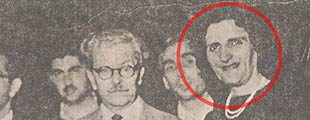Post-Revolution Activities and the National Democratic Front
Following the 1979 Iranian Revolution, Paknejad was released from prison. While many leftist groups initially supported the overthrow of the Shah, divisions quickly emerged regarding the direction of the new government. Recognizing the authoritarian tendencies of the emerging Islamic Republic, Paknejad sought to unify socialist and democratic forces against the new regime’s repressive policies.
On February 23, 1979, he played a key role in founding the National Democratic Front (NDF), a coalition of socialist and secular democratic activists who opposed the clerical rule of Ayatollah Khomeini. Unlike other leftist groups that attempted to align with the Islamic Republic in its early stages, the NDF took a critical stance from the outset, warning against theocratic authoritarianism.
The NDF advocated for workers’ rights, women’s emancipation, political pluralism, and a democratic socialist government. However, their opposition to the growing power of the clergy made them a target of state repression. Within months, the Islamic Republic cracked down on the NDF, arresting and persecuting its leaders. Paknejad, undeterred, continued his activism underground, publishing critiques of the government and organizing resistance efforts.

